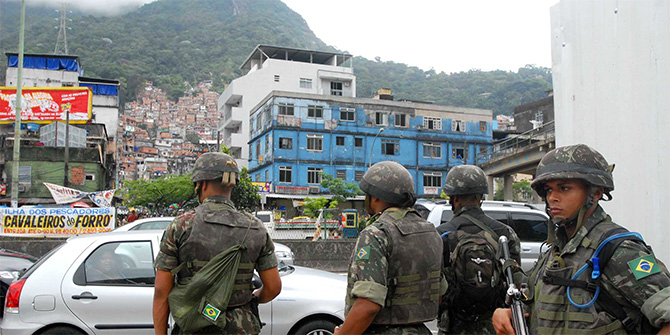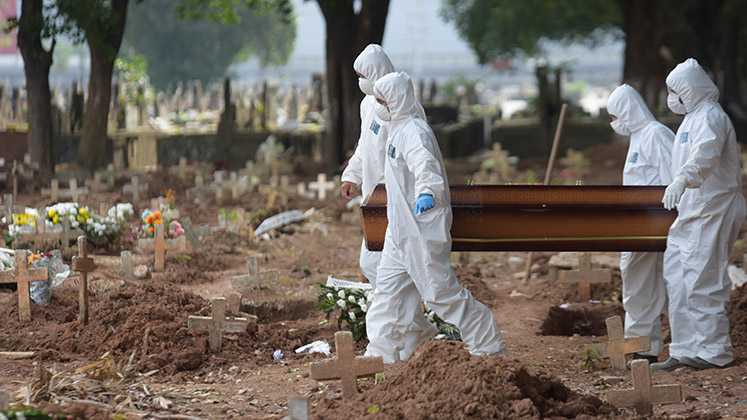
 In terms of both support and discourse the heart of Jair Bolsonaro’s Social Liberal Party lies in Rio de Janeiro. Here, aggressive messaging on rising crime and rampant corruption managed to turn a ragtag bunch of political misfits, former members of the security forces, and Bolsonaro associates into the epicentre of Brazil’s recent political earthquake. But as scandals around criminality and corruption begin to reach even the Bolsonaro family, these same strengths could soon become weaknesses if the Rio delegation and the wider PSL cannot pivot away from bombast and towards effective governance, write Mark S. Langevin (George Mason University) and Edmund Ruge in the second of a two-part series on the roots and the role of the Partido Liberal Social.
In terms of both support and discourse the heart of Jair Bolsonaro’s Social Liberal Party lies in Rio de Janeiro. Here, aggressive messaging on rising crime and rampant corruption managed to turn a ragtag bunch of political misfits, former members of the security forces, and Bolsonaro associates into the epicentre of Brazil’s recent political earthquake. But as scandals around criminality and corruption begin to reach even the Bolsonaro family, these same strengths could soon become weaknesses if the Rio delegation and the wider PSL cannot pivot away from bombast and towards effective governance, write Mark S. Langevin (George Mason University) and Edmund Ruge in the second of a two-part series on the roots and the role of the Partido Liberal Social.
Brazilian president Jair Bolsonaro’s party achieved electoral success throughout Brazil in 2018, but its heart and soul can be found in Rio de Janeiro. Oddly, Brazil’s conservative-nationalist political realignment does not follow the beat of the military marching band but rather the street-corner samba of its picture-postcard former capital.

The Social Liberal Party (PSL) was established in the state of Pernambuco as the serene voice of economic liberalism, but it is now firmly anchored in Rio, home both to President Bolsonaro and to the party’s largest state congressional delegation. These days the PSL is anything but serene, and least of all its Rio de Janeiro contingent.
Quiet abstention elected the social conservative and evangelical bishop Marcelo Crivella as mayor of Rio de Janeiro in 2016. But the political arena began to stir again in 2018 when newly affiliated PSL candidates whipped up a voter frenzy with a relentless drum beat of extreme social-media posts and political disruption that drove home a straightforward message on fighting crime and corruption. Their promise to upend the political establishment in Brasilia and purge violent crime at home went over well, making Rio de Janeiro the epicentre of Brazil’s recent political earthquake.
Why Rio de Janeiro?
The stage was set for the PSL’s stunning victory in Rio de Janeiro by a wave of violent crime and the arrest of two former governors on corruption charges.
Violent crime hit its lowest ever level in 2012, but by 2018 the homicide rate had jumped a massive 37 per cent from 28.7 to 39.3 per 100,000 inhabitants. At the same time, the once-lauded policing programme known as Pacifying Police Units (UPP) fell apart as the state of Rio de Janeiro’s finances collapsed during the recession. This period also saw Brazil hold both the 2014 World Cup and the 2016 Rio Olympics, making failures to curb crime all the more visible and embarrassing to cariocas.
The federal government’s decision to deploy the armed forces within the city’s poorest and most violent neighbourhoods n 2018 only reaffirmed the severity of the public-security threats woven into people’s everyday lives, while the assassination of the much-loved city councillor and activist Marielle Franco raised the spectre of renewed political violence.

Most parties focused on what needed to be done in Brasilia, but the PSL’s Rio de Janeiro contingent kept its focus on fighting crime at home. In return the state of Rio de Janeiro sent more candidates from the PSL to the state assembly (13) than from any other party, while also electing more PSL candidates to the federal Chamber of Deputies (12) than did any other state.
The PSL’s recipe for success
The PSL’s recipe for success made celebrities of former political misfits.
Hélio Fernando Barbosa Lopes – better known as Hélio Bolsonaro after adopting the president’s surname for his campaign – garnered the most votes of any federal deputy candidate in the state. Yet, just two years previous Lopes had attracted only 480 votes in his run for the Nova Iguaçu city council with the Social Christian Party (PSC). Lopes, who received a personal donation of R$45,000 from Jair Bolsonaro and another R$16,717 from the PSL state directorate, is one of few members of the Rio de Janeiro PSL congressional delegation to have received substantial party funding.
The delegation’s two female candidates also received strong party backing. Major Fabiana, a major in the state military police force, gained a certain notoriety for drawing her gun on an armed assailant outside a school near the city’s Jacarezinho favela in 2014. She was given over R$87,000 by the PSL leadership, which constituted 95 per cent of her total campaign donations. 27-year-old lawyer and catholic anti-abortion campaigner Chris Tonietto received a further R$73,000 from the party. The rest of the PSL’s Rio de Janeiro delegation had to rely on private effort, initiative, and resources.
Those with significant wealth at their disposal – namely world-class swimmer Luiz Lima and supermarket magnate Lourival Gomes – ran entirely self-financed campaigns. Others turned to crowdfunding, family and friends, or small fundraisers at the neighborhood bar.

The PSL’s Rio delegation is mostly composed of middle-aged men with backgrounds in security. Seven of its 12 federal deputies have worked for state police, federal police, or the armed forces. Seven grew up outside of the city. Only two had held elected office prior to their 2018 campaigns. The profiles of two men in particular reflect those of most of the Rio de Janeiro delegation:
- Daniel Silveira:
A 36-year-old native of Petropolis and military police officer who rose to fame after destroying a street sign erected in honour of murdered activist Marielle Franco. Silveira received R$13,000 from the PSL and ran a successful campaign with only R$34,000. He had previously run for vice-mayor on the failed mayoral ticket of Jair Bolsonaro’s eldest son Flávio. - Sargento Gurgel:
This 38-year-old from Nova Iguaçu is a civil police sergeant who failed in his bid to win election as Brazilian Labour Party candidate for state deputy in 2010 and failed again as a Christian Labour Party candidate for city council in 2012. Like Silveira, Gurgel ran a low-budget campaign in 2018, spending just over R$50,000. He did not receive any financial backing from the PSL. Gurgel also founded and made himself president of the Brazilian Institute for Public Security and Research, of which he is the only member.
A family affair: the Bolsonaros in Rio de Janeiro
The leader of the Rio de Janeiro PSL congressional mission and former president of the state directorate is Flávio Bolsonaro, the eldest of Jair Bolsonaro’s four sons – brother Eduardo is a PSL Federal Deputy from Sao Paulo whereas Carlos is a city councillor in Rio.
Flávio, a 37-year-old lawyer and Rio de Janeiro native, had previously served as a state deputy, winning consecutive terms in 2002, 2006, 2010, and 2014, first as a member of the Progressive Party (2003-16), then with the PSC (2016-18), before switching ultimately to the PSL alongside his father and brothers.
State congressional records demonstrate the new senator’s emphasis on law enforcement. Flávio took the helm of several permanent commissions on public security, authored legislation on employment rights for law enforcement and security workers, and gave out many awards and honours to state police officers and members of the federal armed forces. He always made sure that law enforcement and the armed forces were on side of the Bolsonaros.
Flávio announced that he would cede his position as president of the PSL state directorate when a series of interrelated crime and corruption scandals broke after the October 2018 election. Brazil’s Council for the Control of Financial Activities (COAF) reported 42 irregular bank transactions of R$2,000 each between Flávio and one of his employees, Fabricio Queiroz (a former military police officer). A criminal investigation is pending, and the wider scandal could swamp Flávio and the Bolsonaro clan in the coming months.

Meanwhile, a police investigation and the subsequent arrest of members of the Rio de Janeiro militia known as the Office of Crime revealed that Flávio Bolsonaro’s state assembly office employed the mother and wife of Adriano Magalhães da Nóbrega, a former captain of the Rio de Janeiro military police special-forces unit and also an active militia leader. The militia under Nóbrega’s command is suspected of carrying out the assassination of Rio de Janeiro city councilwoman Marielle Franco in 2018.
Flávio pleaded ignorance and suggested that the decision to employ Nóbrega’s mother and wife was made by Fabricio Queiroz, already the subject of the Control of Financial Activities scandal. All of these allegations undermine Flávio’s political leadership and raise questions about the PSL’s relationship with organised crime. Moreover, the situation could trigger internal dissent within the party just as it prepares to bring its significant influence to bear in the national congress.
Carlos Jordy, a former Niterói city council representative and newly elected PSL federal deputy, stands ready to pick up the pieces. Jordy is a 37-year-old with a degree in tourism. In 2011 he worked in the finance department of the city of São Gonçalo before being elected to the Niterói city council in 2016 as a member of the Social Christian Party (PSC).
He aligned his political fortunes with the Bolsonaro family early in his career, switching to the PSL in early 2018, and launched his federal deputy campaign after only two years as a city councillor. During his 2018 campaign he did not receive any financial support from the PSL and spent less than R$60,000 to secure the fourth highest number of votes in the entire state.
Jordy mimics the president’s rant and rave populism but avoids the controversy and corruption associated with Flávio. He is the rising star of the conservative-nationalist movement and could emerge as the leader of the Rio de Janeiro congressional contingent by the end of 2019 if he can replace social-media mayhem with legislative leadership.
Corruption, crime, and and congressional cohesion
Jordy and his fellow PSL members now stand at a political crossroads. They can continue to play out the politics of disruption to maximize their number of likes and followers or they can exert discreet leadership aimed at building a congressional coalition for the game-changing economic and fiscal reforms advocated by Minister of the Economy Paulo Guedes. In power the heart and soul of the president’s party will be tested in a context quite distinct from the disorder and social-media agitation that drove the PSL’s electoral victory in 2018.
First, the PSL congressional delegation is inexperienced in the political arts of legislation and leadership. The party demonstrated notable cohesion around the pillars of economic liberalism and the fight against corruption and crime during the campaign, but the recent scandals involving Flávio and the party’s election finances now challenge the very foundation of the PSL’s credibility. Constituents and adversaries alike are reminded that little is known of the party’s internal workings, its collective decision-making, or its financial accounting practices.
The independent thinktank Transparência Partidária ranks the transparency of Brazilian political parties every year, finding recently that the Workers Party (PT) and the recently established NOVO party score highly whereas the PSL has the lowest score of any of the 33 parties examined. Though limited to the comparative analysis of party websites, the study suggests that the president’s party offers very little information about its leadership, organisational capacity, or finances.
This was underscored by a recent campaign-financing scandal which led to the dismissal of PSL president Gustavo Bebianno, as well as his distancing from the Bolsonaro clan. Most of the Rio de Janeiro delegation did not rely on the PSL for financing, but if they cannot stop the spread of such scandals, the whole group will see an erosion of credibility and legislative leadership.
Second, the PSL’s association with the security forces, the “bullet” caucus, and a push for liberalisation of gun ownership poses reputational risks if existing crime levels do not recede.
The president acted swiftly to liberalise gun ownership and Minister of Justice Sergio Moro also introduced a set of controversial legislative measures to fight crime, but neither effort appears to envisage initiatives that will have real effects. Most importantly, they do not provide additional resources or institutional coordination to strengthen the investigation and prosecution of crime in Brazil, where some four of every five murders go unsolved.
A more integrated, smart-strategy approach would involve job creation, better public education, increased resources for intelligence and investigations, community cooperation at all levels of governance, and strengthened federal-state coordination. The PSL could quickly lose favour with voters if Bolsonaro and congress fail to adopt and finance these kinds of smart crime-fighting policies over the next 12 to 24 months. It is the party’s Rio de Janeiro delegation that will take much of the blame if violence fails to come down.
After years of economic distress and political instability, Brazil has become increasingly difficult to govern. Aside from the president, Rio de Janeiro federal deputies Hélio Fernando Barbosa Lopes, Carlos Jordy, Daniel Silveira, and Major Fabiana amongst many others will need to pivot towards governance and away from social-media bombast if they are to have any chance of leading the country to safe harbour and protecting the PSL from its association with criminal elements and corrupt practices.
Like President Bolsonaro himself, they are extraordinarily ill-equipped to forge the unity required to govern effectively, but this is the historic opportunity offered up to them by Brazilian democracy.
Notes:
• The views expressed here are of the authors rather than the Centre or the LSE
• Please read our Comments Policy before commenting





